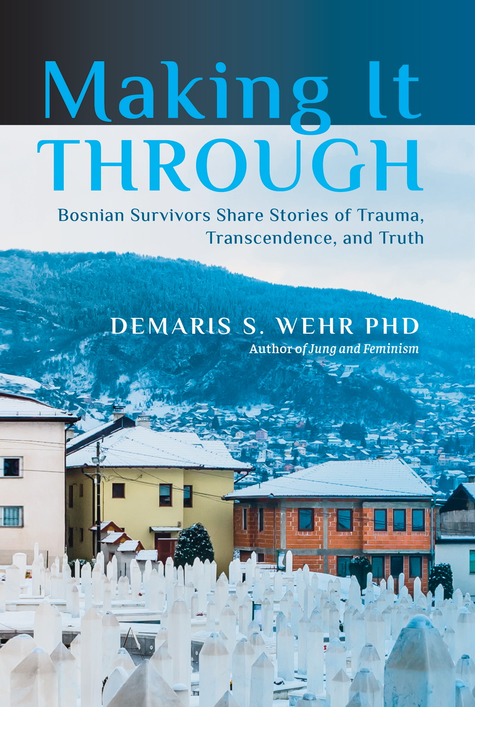| |
| View this email online if it doesn't display correctly |
| |  |
Announcing Making It Through: Bosnian Survivors Share Stories of Trauma, Transcendence, and Truth
Imagine the most cherished places of your childhood overrun by unspeakable atrocities—villages shelled, snipers killing neighbors in the village square, libraries burning, parents sneaking children through tunnels in the middle of the night, rape, murder, and torture. This was the reality of "ethnic cleansing" in the Balkans in the 1990s.
Dr. Demaris Wehr, Quaker, Jungian therapist, peacebuilder, and the author of Jung and Feminism (Routledge), came to Bosnia after the war to assist in peacebuilding trainings, and she returned several times to bear witness as survivors of the genocide told her their stories in one-on-one interviews. She asked each of them, “How did you make it through?”
A pattern slowly revealed itself to Demaris. The interviewees themselves hadn't realized it during the war but become aware of it during the interviews. Demaris named it “centerpost,” a powerful internal value such as family, faith, or duty that kept them from losing their center during turbulent times. It's based on Odysseus’s perilous sea journey, when he made it through tremendous difficulties requesting to be tied to the ship's mast, the centerpost. Each of the interviewees held to their centerpost during the worst of times, and were able to hold steady and help others.
No matter the era, we humans seem destined to be blindsided by our shadows and to project them onto others until we do the difficult work of reclaiming our projections.
In Making It Through, eight ordinary Bosnians demonstrate ways that even in the face of unimaginable horrors, they were able to hold on to their their truths and “make it through,” a lesson we can apply to the trials we face today.
|
| | | | | Demaris S. Wehr Ph.D. has had a lifelong interest in peacebuilding, starting with her Quaker background. She taught religion and psychology at Swarthmore College, Harvard Divinity School, and Episcopal Divinity School. She later became a Jungian psychotherapist, conference speaker, workshop leader, and peacebuilder. Currently on the faculty of The Sophia Center for Transformative Learning, an online graduate school based in Jungian thought, gender studies, and transformative learning, Demaris gives lectures and leads workshops at home and abroad. She is the author of Jung and Feminism: Liberating Archetypes. She lives in Hanover, New Hampshire with her Maine coon cat. For more information, visit www.demariswehr.com.
“The horrors of the Bosnian war have been well-documented, and yet if the world is not to see that region descend into war again, then Milka Marinković’s observation is crucial: All three nations in Bosnia-Herzegovina—Bosnian Muslims (Bosniaks), Bosnian Serbs, and Bosnian Croats—need to reenvision history. Presently, each nation has a story justifying its actions and its position. We need one story. Relating experiences from all sides of the conflict, Demaris Wehr gives this community, and us, a common narrative. She offers us insight into forgiveness and reconciliation from the frontlines of anguish. The wisdom of the narrators in this volume is wisdom that seems particularly apt and necessary at this moment in history: Forgiveness is about leaving the negative energy behind and having space for positive energy. As Sabiha Husić reminds us, ‘It’s important to distinguish between forgiving and forgetting.’” — The Rev. Canon Mpho Tutu van Furth, Executive Director of the Tutu Teach Foundation and coauthor with Archbishop Desmond Tutu of The Book of Forgiving and Made for Goodness
|
| Table of Contents - Foreword by Polly Young-Eisendrath PhD
- Part I—Introduction
- Map of Bosnia and Herzegovina
- Introduction
- Chapter One: The Centerpost
- Chapter Two: How Beautiful Bosnia Became Host to Concentration Camps
- Part II—The Interviews
- The Karuna Center Participants
- Chapter Three: Forgiveness—Vahidin Omanović
- Chapter Four: Humility—Milka Marinković
- Chapter Five: Devotion to Family—Senka Jakupović
- The Clinicians from Clinica Medica in Zenica
- Chapter Six: Faith—Sabiha Husić
- Chapter Seven: Integrity—Marijana Senjak
- The Sarajevans
- Chapter Eight: Duty—Jakob Finci
- Chapter Nine: Optimism—Salih Rasavać
- Chapter Ten: Transcendence—Vjekoslav Saje
- Part III— Conclusion
- Chapter Eleven: Making It Home
- Further Reading
- Acknowledgments
- About the Author
|
| | |
|
|